Sugar has developed quite a reputation for being unhealthy. If you like drinking your coffee sweet but want to cut down on your sugar intake, you’ll probably want to look for natural coffee sweeteners instead.

Sure, artificial sweeteners are just as effective at giving your coffee that sweet flavor. But many people are now trying to avoid these since these too have been linked with some health concerns.
Table of Contents
- Why you should cut down on sugar
- The best coffee sweeteners
- How to reduce sugar intake
- FAQ
- Conclusion
Why You Should Cut Down on Sugar
Most people know that they should cut down on sugar, but they might not know just how much sugar they eat every day.
According to a study, the average person consumes about 77 grams of sugar every day, which is more than the recommended amount.
So, while your morning coffee may not hold a big chunk of those 77 grams, replacing it with another type of sweetener is still a good starting point.
Here are the reasons why you should replace any added sugar:
Calories

According to USDA data, 100 grams of sugar contains 387 calories, so the sugar alone makes up for almost 300 calories of an American’s daily intake.
Considering that 2000 calories are the recommended daily intake for most people, many of your allotted calories are just from sugar.
This is why it’s important to be aware of how many grams of sugar you’re eating every day and cut down where you can.
Health Issues
Various health concerns are linked to consuming too much sugar.
For instance, too much sugar can lead to weight gain, putting you at risk for other health problems like heart disease, diabetes, and even some cancers.
In addition, sugar is infamous for being the number one cause of tooth cavities, and since a lot of people drink a big cup of coffee first thing in the morning (sometimes before even brushing their teeth), this can be a big problem.
Sugar Crashes

Everyone that has ever eaten too much sugar knows the feeling of the dreaded “sugar crash.” This happens when your body has too much sugar, and it starts to feel sluggish and tired.
When you eat sugar, your body releases insulin to help process it, which can cause your blood sugar levels to drop suddenly, leading to that tired feeling.
Ironically, sugar crashes can happen within an hour or two of eating sugary foods or drinks, which is much sooner than the time needed for the effects of caffeine to wear off.
The result? A coffee that not only doesn’t give you an energy boost but leaves you feeling more tired than before.
It Changes the Taste of Coffee
This may sound a bit pointless since the whole point of sugar is to change the taste of coffee, but the problem is that sugar masks some of those pleasant secondary flavors, especially if they’re drinking premium coffee.
That is why many coffee drinkers prefer drinking their coffee entirely black so that they can feel every single flavor that the coffee has to offer.
The Best Coffee Sweeteners
Now that we’ve gone over some of the reasons why you might want to cut down on sugar let’s take a look at some of the best natural coffee sweeteners that you can use instead.
1. Honey and Honeycomb

Honey is a great coffee sweetener because it adds sweetness and a bit of extra flavor.
Depending on the type of honey you use, you can also get a slight floral or fruity note in your coffee, making it an excellent addition to Arabica light roasts with fruity flavors.
Alternatively, honey is great at giving dark roasts some extra depth and richness, compensating for the lack of the coffee bean’s natural aroma, mostly replaced with roasting flavors.
Honeycomb is another great way to sweeten your coffee, and it also has the added benefit of giving your cup a bit of a crunch.
Just be careful not to add too much, or you’ll end up with a mouthful of wax.
The only drawback to honey and honeycomb is that you mustn’t add it to coffee when it’s still hot since this can change the taste and lose its health benefits.
Instead, wait for your coffee to cool down a bit first, or add it after pouring in your milk or cream.
2. Maple Syrup
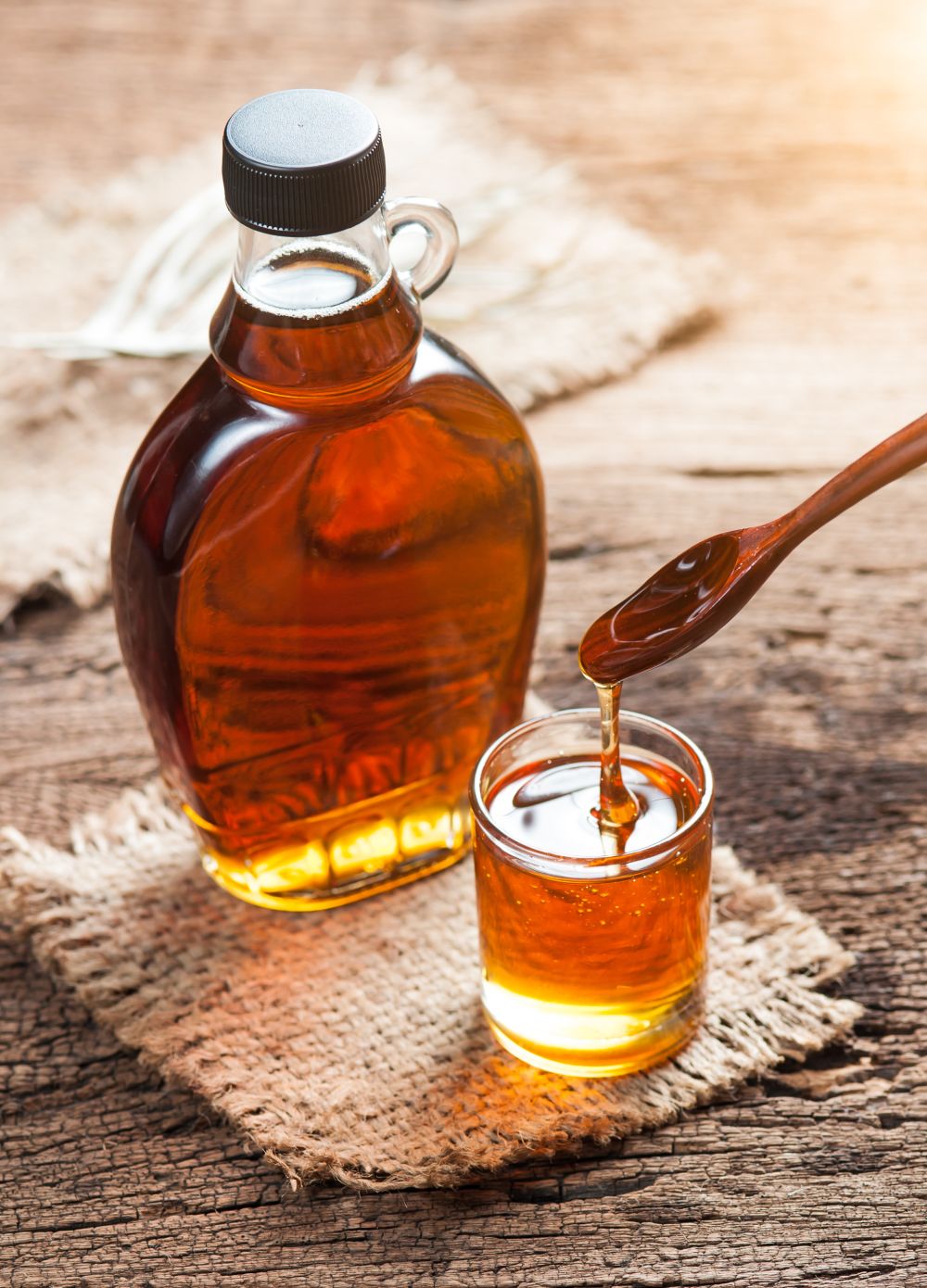
While honey and honeycomb do a great job at sweetening coffee and gaining it some extra floral and fruity notes, maple syrup is ideal for giving your coffee a more robust sweetness with nutty undertones.
This makes it an excellent choice for dark roasts, which can sometimes taste a bit too bitter on their own. It also has an earthy flavor that goes well with the chocolate and nut notes that are often found in dark roasts.
Besides, maple syrup dissolves well even in cold drinks, so if you’re more partial to iced coffee or frappuccinos, this is your sweetener.
The only downside to using maple syrup is that the flavor can be easily masked by some of the other things you may add to your coffee, such as milk or creamer.
So, if maple syrup is not the only thing you’re adding to your coffee, make sure to use more.
3. Agave Nectar
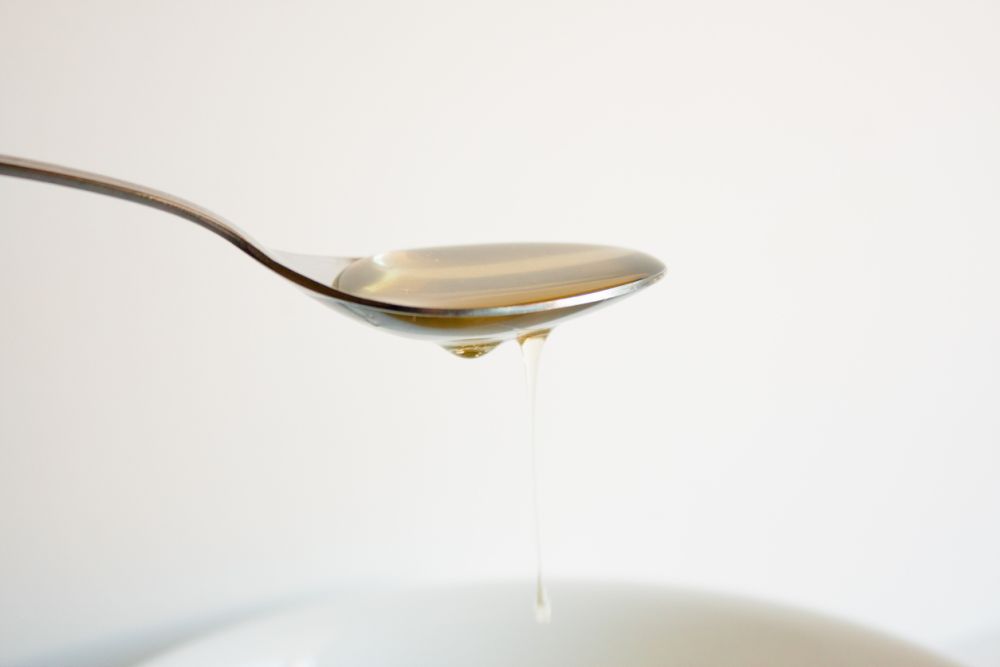
Agave nectar (agave syrup) is another great natural coffee sweetener with a different flavor profile, and many consider it to be the vegan alternative to honey.
It has a more neutral taste, similar to honey, but it is also slightly floral with hints of citrus. Besides, it dissolves quickly, making agave nectar an excellent choice for iced coffees or cold brews.
It has half the sweetening power of regular sugar, and because it has a minimal effect on blood sugar, it’s recommended for those that need to reduce their carb intake.
One noticeable drawback of agave syrup is that it’s pretty high in calories, at 310 calories per 100-gram serving.
4. Stevia

Stevia has become very popular in recent years as a natural sugar substitute, and it’s also great for sweetening coffee.
It’s completely calorie-free because the human body does not metabolize the active ingredients within the stevia, so it won’t add any extra calories to your coffee. It doesn’t have any of the negative effects that sugar does.
Stevia is also very concentrated, so much so that it’s considered to have 50 to 300 times the sweetness of sugar.
One thing that makes stevia great for use in coffee is that it’s heat-stable, so unlike honey, you don’t have to worry about adding it to your coffee while it’s still piping hot.
Besides, the taste of stevia lingers on the tongue for longer, so you don’t have to sip on your coffee as often to keep the sweetness level up.
The only drawback of stevia is that some people say it has a slightly bitter aftertaste. However, this is only a problem if you use too much.
5. Monk Fruit Extract
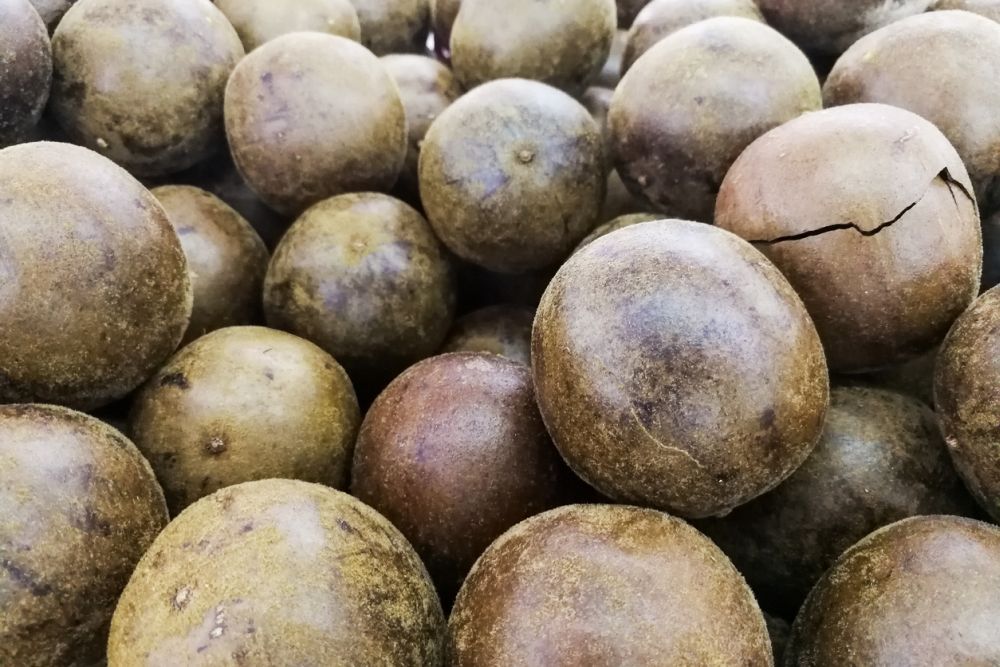
This one is a bit newer to the scene. Still, it’s already gaining popularity as a natural sugar substitute, and it’s derived from the monk fruit, a type of fruit that naturally grows in Southeast Asia.
Like stevia, monk fruit extract is also very concentrated and has no calories.
It’s also 250 times sweeter than sugar, and it’s rich in substances called mongrosides which seem to have a positive effect on preventing inflammation.
Unfortunately, since monk fruit extract is still relatively new to the market, not enough studies were conducted to determine all of the benefits of this particular sweetener.
However, as far as USDA regulations are concerned, monk fruit extract is considered safe for human consumption.
Note: Since it’s rare, monk fruit extract is often mixed with other natural coffee sweeteners. As such, make sure that you read the label of your sweetener carefully before using it.
6. Allulose

Yet another relatively new sugar substitute, allulose, is found naturally in foods like figs, raisins, and maple syrup.
It’s ideal for those that aren’t looking for very powerful sugar substitutes since, unlike stevia or monk fruit extract, allulose only has about 70% of the sweetening effect of sugar.
Besides, as far as taste is concerned, allulose is the closest thing to actual sugar out of all the entries on our list, so this may be a good choice for those interested in transitioning away from sugar.
You should keep in mind that since allulose is derived from sugar, it’s very much digestible. This means that, unlike some of the other entries on our list, allulose will add to the calories in your coffee.
However, the caloric value is extremely low since the caloric value of allulose in humans was determined to be about 0.2 to 0.4 kcal/g.
Note: Allulose can gain laxative properties when consumed in large quantities, so avoid using too much. (over 0.4 grams per pound).
7. Yacon Syrup
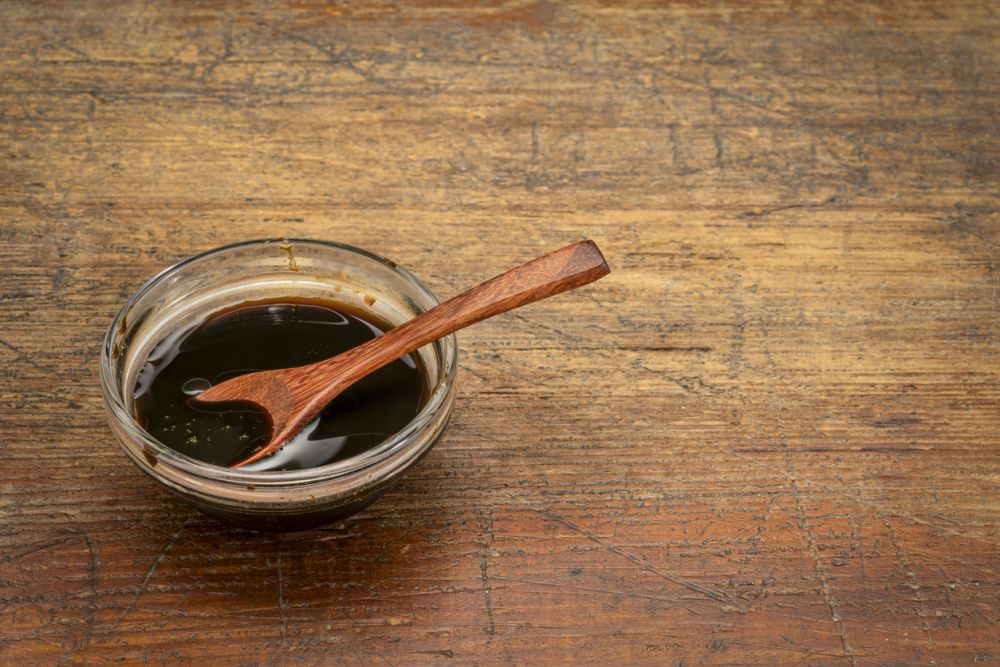
Yacon syrup is derived from the yacon fruit, and it’s one of those relatively new products to us, but it’s been part of the South American diet for centuries.
The fruit itself is extremely popular in Peru and Bolivia, and it’s recommended for people suffering from diabetes or any other digestive properties where sugar would otherwise be forbidden.
Making the syrup is done similarly to that of maple syrup via an evaporator, and its taste has been described as being somewhat similar to that of molasses or caramel.
Like stevia, yacon syrup is rich in a type of sugar molecule that the human body can’t digest, so yacon syrup contains one-third of the calories of regular sugar.
However, yacon syrup isn’t a very powerful sweetener either, so you’ll need to add more of it to match the effects of your coffee sugar.
Note: Yacon syrup can gain laxative properties when consumed in large quantities, so limit yourself to 20 grams per day.
8. Molasses
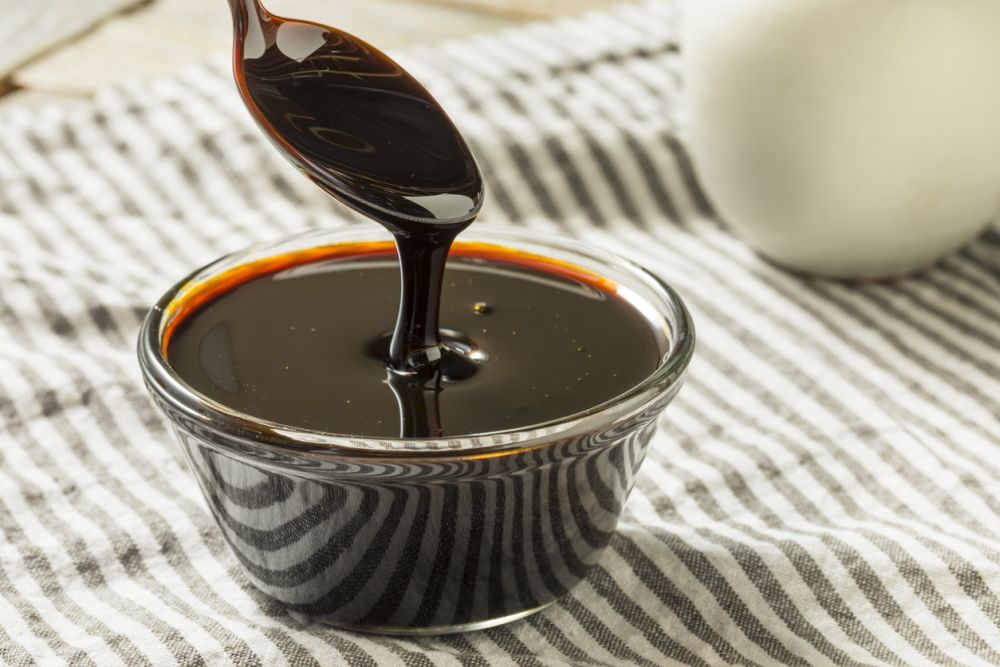
It’s ironic to think that sugar production can lead to the discovery of a natural sugar alternative, but that’s exactly what happened with molasses.
Molasses are a by-product of the sugar refining process, and it’s all the impurities left behind after the sugar has been extracted.
These impurities give molasses its characteristic dark color and strong flavor, which can be too overpowering for some people.
This isn’t necessarily a bad thing since the characteristic taste of molasses goes well with coffee, especially those using a darker roast.
One disadvantage of using molasses is that it still contains a lot of natural sugar (more than half of it is sucralose), and it’s also pretty calory-dense, standing at ~290 calories per 100-gram serving.
9. Coconut Sugar
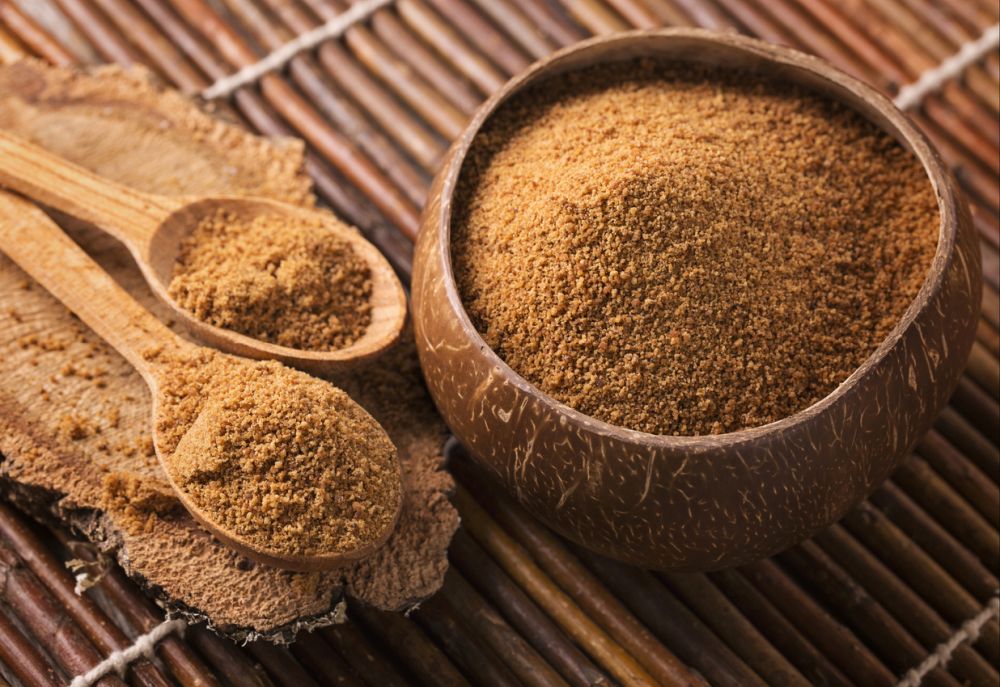
Something about the naturally occurring nutty and chocolate flavor of coffee sounds like an ideal mixing partner for coconuts, and that’s where coconut sugar comes in.
Coconut sugar is made from the sap of the flower bud stem of the coconut palm, and it’s a type of unrefined sugar with a lower glycemic index than regular sugar.
Unlike some of the other sugar alternatives listed so far, coconut sugar has no known health benefits, aside for the ones associated with the few minerals that it contains (iron, zinc, calcium, and potassium).
So, its main (and only) selling point is that it’s a healthier natural sweetener.
Coconut sugar has a very low glycemic index (35), making it ideal for those that struggle with erratic blood sugar levels.
10. Cinnamon

Adding cinnamon to coffee is an extremely popular way of making your cup of joe a bit sweeter without actually adding any natural coffee sweeteners.
Cinnamon has a wide variety of health benefits. For instance, it’s been shown to help regulate blood sugar levels, and cinnamon has also been linked to improved cognitive function.
Besides, that signature taste of cinnamon can also help mask some unpleasant coffee flavors that you were planning to hide with sugar anyway.
Unfortunately, cinnamon does come with its fair share of drawbacks.
For starters, cinnamon doesn’t dissolve in any kind of liquid, so you’ll need to make sure that you know precisely how you can give your coffee the great aroma of cinnamon without actually swallowing a mouthful of cinnamon.
Secondly, cinnamon can give the coffee a powerful spicy flavor to your coffee if you add too much of it, so make sure that you experiment with different quantities before you find the perfect balance.
11. Cocoa

Cocoa can be seen as the child-safe version of coffee since the two have a lot in common, such as the bitter undertones of pure cocoa.
Adding cocoa to your coffee is especially recommended if you get your hands on coffee beans with a naturally occurring chocolaty flavor, especially on dark roasts.
Like the cinnamon, cocoa contains no sugar, but the overwhelming flavors will help mask some of the less pleasant undertones in your coffee.
Cocoa is also a lot more versatile than cinnamon since cocoa does dissolve in beverages, especially hot ones, so you’ll have an easier time incorporating it into your coffee.
And, of course, there’s the bonus that cocoa is packed full of antioxidants and essential nutrients, so adding cocoa to your coffee is delicious and healthy.
12. Vanilla Extract

Many people view vanilla’s taste as the perfect opposite of coffee’s signature bitterness. While that’s not strictly true, the two flavors manage to balance each other out quite nicely.
Like the previous two entries, vanilla offers no sweetness whatsoever to the coffee, but the flavors and aromas of vanilla are more than enough to make up for that.
Adding a few drops of vanilla extract is an excellent way of making your coffee taste more complex and sophisticated. It can also help mask some of the more unpleasant undertones.
The only downside to using vanilla extract is that it’s quite more expensive than the other options on this list, but it’s worth trying out if money is not an issue.
How to Reduce Sugar Intake
It’s one thing to know that there are things with which you can replace sugar in your coffee, but it’s another thing entirely to know how to reduce your sugar intake.
Here are a few tips that can help you do just that:
Slowly Cut Down on The Sugar

If you’re used to adding a lot of sugar to your coffee, it will shock the system if you suddenly stop. To avoid that, it’s best to slowly cut down on the amount of sugar you add to your coffee each day.
Start by reducing the amount by half, and then continue to reduce it until you’re no longer using any sugar. You might find that your coffee doesn’t taste as good at first, but give it some time, and your taste buds will adjust.
Alternatively, you could consider switching to black coffee entirely, so you won’t need any of the natural coffee sweeteners listed so far.
Use Creamers and Milk
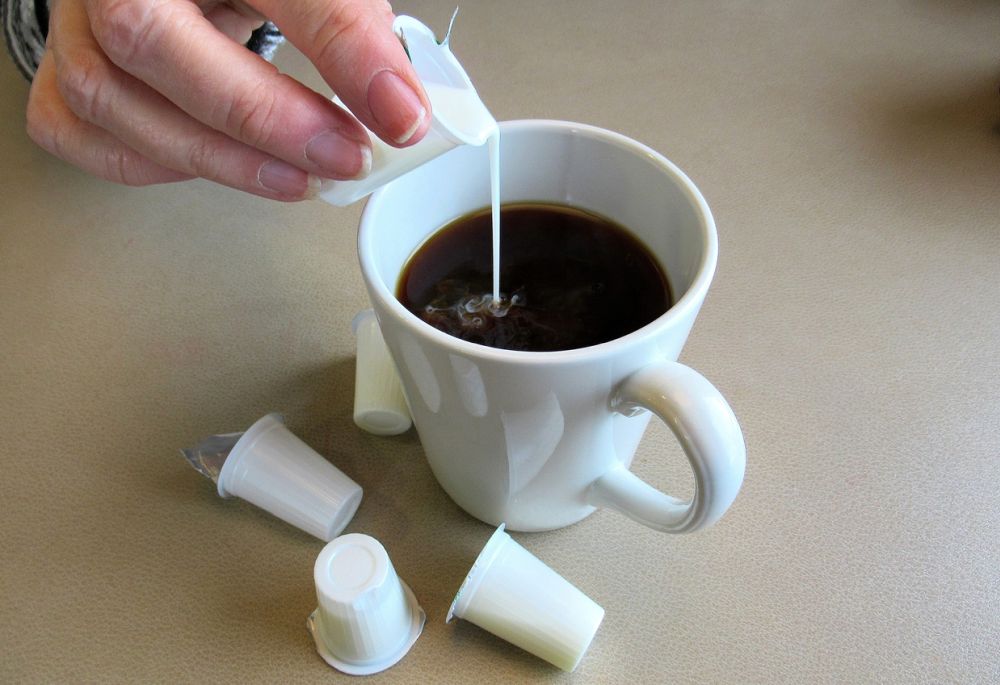
Another way to mellow out some of the bitterness in coffee is to add creamers and milk. These not only add sweetness but also help to balance out the flavors.
There are all sorts of different creamers and milk available on the market, including dairy and plant-based ones, so make sure to experiment until you find one that you like.
Natural Coffee Sweeteners (FAQ)
Discover more helpful information about natural coffee sweeteners:
What is the healthiest way to sweeten coffee?
The healthiest way to sweeten your coffee is arguably by using stevia since it’s a completely natural product that doesn’t contain any calories or carbs.
What can I use instead of sugar in coffee?
Some of the best natural coffee sweeteners are stevia, honey, maple syrup, and coconut sugar.
Which coffee drink is healthiest?

The healthiest type of coffee to drink is a cold brew served black (no natural coffee sweeteners or milk) because it has zero calories, carbs, and fat.
However, it’s naturally packed with vitamins and minerals. The fact that it’s a cold brew means that it’s also less acidic than regular coffee, making it better for those with sensitive teeth and stomachs.
Is putting honey in your coffee good for you?
As long as you know that the honey you’re adding is 100% honey and not syrup mix, it’s perfectly fine to add it to your coffee.
Is coconut sugar natural?
Yes, coconut sugar is a natural coffee sweetener made from the flower bud stem of the coconut palm. It’s often praised as a healthier alternative to refined sugar since it contains vitamins, minerals, and fiber.
Natural Coffee Sweeteners (Conclusion)
There are many different ways of making your coffee sweeter, but if you’re looking for a more natural option, these 12 choices should be more than enough to get you started.
Don’t be afraid to experiment with different combinations and quantities until you find the perfect balance for your taste.
And, of course, remember to enjoy your coffee however you like it best!
Leave a Reply